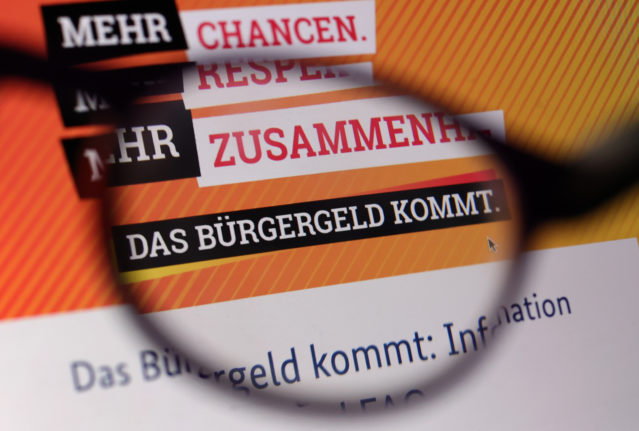For lots of us, this is a hard time of year as we adapt after the festive season and face a long stretch of winter ahead.
Although it isn't easy to remain upbeat, there are some parts of German culture that we could embrace to lift our moods in time for spring.
Get outside
When I moved to Berlin three years ago in January I wondered if I’d made the wrong decision. Having only visited the city in summer and in the run up to Christmas beforehand, I felt like I’d landed on another planet.
Grey, dull and foggy: it was like the city could only be viewed in black and white, there was no colour. It then got particularly cold and there was a flurry of snow.
Adding to this lonely landscape was the fact that people didn’t seem to be friendly at all. To be fair, that's probably just part of the Berliner Schnauze, which can turn daily interactions into a stand-off. But in winter, perhaps understandably so, people are definitely a lot moodier compared to when the sun is out.
It is tempting to stay inside when these kinds of scenes are facing you outside.
But make like the Germans and get in touch with nature. Get out to the parks and outdoor spaces or visit the lakes and countryside around you to see what it’s like during the winter time.
 A Highland cow in Bavaria's Aitrang on January 9th. Photo: DPA
A Highland cow in Bavaria's Aitrang on January 9th. Photo: DPA
When it gets really cold lots of Germans like to go Schlittschuhlaufen (ice skating) on frozen waterways, although personally this is too much of a daredevil activity for me.
Still, you can enjoy the atmosphere even if you don't try an activity like that.
If you live in the city, soak up the quieter streets before they’re full of tourists come summer.
It may be a bit chilly, rainy or dull but your body and mind will be glad to have a bit of movement and some daylight.
READERS' TIPS: Your guide to getting through the German winter
Invest in the right clothes
The Germans are known for being practical and their dedication to suitable clothing is where they truly shine. In fact, I don't think I've ever seen a German person outside without a scarf during the winter months.
Their saying: “Es gibt kein schlechtes Wetter, es gibt nur falsche Kleidung” (There is no such thing as bad weather, only unsuitable clothing) is a good one to live by and certainly makes going outside more enjoyable.
In the colder months you’ll find Germans clad top-to-toe in waterproof clothing and thermal underwear, while cyclists will be kitted out in reflective gear – or even have recycled Christmas lights sewn into their vest.
Your corner shop will sell heavy-duty socks, while the younger generation will be tucked up in snowsuits (Schneeanzüge) is in order to protect them from the cold.
They're so cute it'll make you wonder if they come in adult sizes…
 Photo: DPA
Photo: DPA
Getting kitted out for winter doesn't have to be expensive: you can pick up some underlayers (vests or leggings), a hat, scarf and gloves quite cheaply and head to a second-hand shop for a big coat if you don't have a trusty jacket already.
Another favourite is Gefütterte Schue – lined shoes or boots. Make sure your footwear is up to scratch to withstand the rain and snow.
Drink tea
Germans are obsessed with tea – and there’s probably no better time to really get on board with this part of their culture than in the colder months. From more classic blends like Schwarztee (black tea), Kamillentee (Camomile) and Fencheltee (Fennel) to specialized styles aimed at sorting out specific ailments, there are loads to try.
An area of Germany known as Ostfriesland or East Fresia, on the North Sea coast, is especially famous for its tea-drinking culture. Almost a quarter of all tea drunk in Germany is consumed there.
You’ll also find that doctors or pharmacists in Germany often encourage you to turn to tea before handing out medication – something that people from countries used to taking pills frequently to cure complaints find absurd at least at first.
Pregnant women are often given Schwangerschaftstee (pregnancy tea) and there's Stilltee (supposed to be soothing) if you're breastfeeding.
If you’re having problems sleeping, Schlaf und Nerven Tee (for your sleep and nerves apparently) might be for you, while Magen und Darm Tee (for your stomach and gut) promises to help with digestive problems.
Now it can go a bit too far – a friend was once prescribed tea for his knee injury that required surgery. Tea cannot fix everything. But it can help keep you warm and hydrated.
READ ALSO: How to get over a cold according to the Germans
Go for Kaffee und Kuchen
It is, of course, not just tea that Germans love to consume. Coffee is also a firm favourite – apparently almost 80 percent of Germans drink coffee every day
So consider getting into the German afternoon ritual of Kaffee und Kuchen, where you meet for an hour or two to enjoy coffee and cake.
Forget strict New Year's resolutions like cutting out sugar, exercising more or giving up alcohol. January is the month where you need all the good things. This is not the time to deprive yourself.
In my opinion, cake is probably the only humane way to get through January. Thanks to all the cafes and coffee houses, there's no shortage of Käsekuchen (cheesecake), and Bienenstich (Bee Sting cake – it's much tastier than the name suggests) and – my personal favourite – Pflaumenkuchen (plum cake).
Be cosy
Getting fresh air is important – but so is being inside. And a great way of making your space more comfortable is to embrace the German culture of Gemütlichkeit or cosiness.
It's arguably one of the most famous German concepts. The word encompasses sensations of cosiness, contentment and warmth. The term can also be extended to refer to the sense of social acceptance and well-being.
So how do you achieve Gemütlichkeit? It might involve a little reorganization of your room or home; some tidying up and purchasing a few items like blankets or candles.
READ ALSO: German word of the day: Die Gemütlichkeit
But you can also experience this cosy feeling in a cafe or restaurant. Explore some cafes to find which one is the most Gemütlich.
Plan a getaway
Sometimes having something to look forward to makes all the difference and that's where booking a holiday comes in. Head to better climes such as Mallorca, which is a firm favourite among Germans.
If you can’t budget for a foreign land or take much time off work, then schedule in a weekend staycation or day trip. Jump on the train (your ticket might even be a little cheaper this year) or the bus and check out the German countryside or small cities.
Check out our Weekend Wanderlust picks for inspiration.
Take in some culture
 Visitors at the Van Gogh exhibit at the Städel Museum in Frankfurt in October 2019. Photo: DPA
Visitors at the Van Gogh exhibit at the Städel Museum in Frankfurt in October 2019. Photo: DPA
Whether it's a cinema visit, a museum or a gallery, soaking up some German culture could be a very good way to get through the winter months.
Search online or ask locals if they know of any English-speaking events, such as theatre shows or check out a gig.
From a motorcycle fair in Leipzig to a Beatles musical at various locations throughout Germany, there are some cool events happening throughout the country this month.
And the Berlin Film Festival or Berlinale also takes place during this time, although it's a little later this year, running from February 20th until March 1st.
Visit a sauna
Germans love nothing more than enjoying a hot sauna visit during the colder months (it's even one of Angela Merkel's favourite hobbies). It can be a little scary at first for foreigners due to the strict rules but it's a lovely part of the German relaxation and wellness culture when you get used to it.
There are loads of saunas across Germany which are not too expensive to access.
German “wellness” and spa culture is even part of the country's health care system.
The German equivalent for spa is Heilbad or 'healing bath' or Kurort which literally means 'cure place'. Any town in Germany can qualify and choose to use the prefix 'Bad' or bath before their town name, for example, Bad Sarrow in Brandenburg.
READ ALSO: The truth laid bare – What you need to know about Germany's sauna culture
Go dancing
 Revellers at a cub in Berlin. Photo: DPA
Revellers at a cub in Berlin. Photo: DPA
This depends on where you live but one way to keep warm is zum Feieren gehen (to go partying). Whether it's the local disco, bar or a big club, schedule in a night out where you can dance the night away or have a catch up with friends.
Enjoy your tipple of choice in moderation (we all know the Germans do great beer) and enjoy some music while keeping warm and getting a little bit of exercise in.
And remember, January doesn't last forever and spring is on the way soon.
READ ALSO: The essential words and phrases for a night out in Germany
For those struggling with more serious mental health difficulties in Germany make an appointment with your doctor who can tell you about helpful resources.




 Please whitelist us to continue reading.
Please whitelist us to continue reading.
Member comments